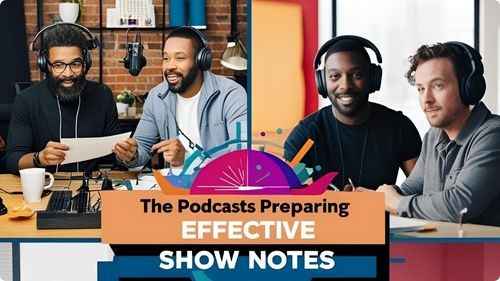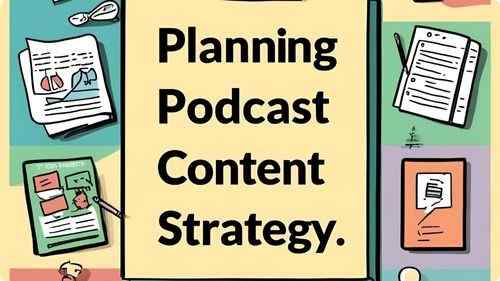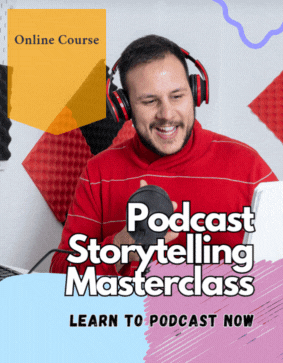How to Write a Podcast Script (WITH TEMPLATES)
33,593 View
Share this Video
- Publish Date:
- May 24, 2025
- Category:
- Learn to Podcast
- Video License
- Standard License
- Imported From:
- Youtube
Tags
Download the podcast script frameworks here: https://jamesm.com/frameworks
Podcasting without a script can be risky business. It can lead to drawn out podcast episodes full of rambling and tangents, leaving your audience frustrated and disengaged.
In this video we're going to be looking at how to write a great podcast script that keeps you on track without stifling your flow and presenting style.
Find out more about podcast scripts: https://amplify.matchmaker.fm/podcast-script-templates/
SOCIALS 👇
Twitter: http://www.twitter.com/jamesmulvany
Insta: https://www.instagram.com/createreachinspire
Facebook: https://www.facebook.com/createreachinspire
Linkedin: https://uk.linkedin.com/in/jamesmulvany
TIMECODES ⌛
0:00 Introduction
0:33 Podcast Scripts
1:13 Podcast Introduction
2:21 Sponsorships or Adverts
3:18 Guest Intros
4:02 Segways & Topic Changes
5:08 Main Topics For Discussion
6:14 Always Summarise
7:09 Outro
7:26 Call To Action
9:25 Podcast Script Frameworks.
#podcast #script #howto
-----------------------------------------
Podcast Coach: Podcasting Profits
🎧 If you've ever asked, “How can I actually make money from my podcast?”—this is your answer. Podcast Coach: Podcasting Profits is a powerful course that shows you exactly how to turn your free listeners into paying coaching clients, almost effortlessly.
You already have an audience tuning in to hear your insights, learn from your expertise, and connect with your message. What many of them really want is more—more access, more guidance, more results. This course will teach you how to bridge that gap and offer coaching in a way that feels natural, authentic, and rewarding for both you and your audience.
Whether you're new to coaching or looking to add a new income stream, this step-by-step training walks you through how to position yourself as a trusted coach, build deeper relationships with your listeners, and monetize your podcast without needing ads or sponsorships.
👉 Click here to join the online course now and start turning your podcast into a thriving coaching business today!
3 Must-Know Podcasting Tips for Your Show
Ensuring Legal Compliance in Your Podcast

Maintaining legal compliance is essential to protect your podcast and its content from potential issues. Secure the necessary rights and licenses for any music, sound effects, or third-party content you use in your episodes to avoid copyright infringement. Obtain permission from guests to record and distribute their contributions, and consider having them sign release forms to formalize their consent. Be mindful of privacy laws by respecting the confidentiality and personal information of your listeners and participants. Additionally, adhere to advertising regulations when incorporating sponsorships or affiliate marketing, clearly disclosing any paid partnerships. Staying informed about relevant laws and regulations ensures that your podcast operates smoothly and mitigates legal risks.
Writing Effective Show Notes for Each Episode

Show notes play a crucial role in enhancing your podcast’s accessibility and SEO performance. Start with a clear and concise summary of the episode, highlighting key topics and takeaways. Include timestamps to help listeners navigate to specific sections of the conversation easily. Provide detailed information about any resources, books, or tools mentioned during the episode, along with relevant links. Incorporate keywords naturally to improve search engine rankings and make your content more discoverable. Additionally, use show notes to promote upcoming episodes, special guests, or related content, encouraging ongoing listener engagement. Well-crafted show notes serve as a valuable reference for your audience and contribute to your podcast’s overall professionalism.
Planning Your Podcast Content Strategy

A well-defined content strategy ensures that your podcast remains focused, relevant, and engaging over time. Start by identifying your target audience and understanding their interests, preferences, and challenges. Develop a content calendar that outlines episode topics, guest appearances, and key themes you wish to explore each month. Balance evergreen content that remains relevant over time with timely topics that address current trends or events in your industry. Incorporate a mix of formats, such as interviews, solo episodes, and panel discussions, to keep your content varied and appealing. Regularly review and adjust your strategy based on listener feedback and performance metrics to maintain the effectiveness and appeal of your podcast.
Frequently Asked Questions
How can I effectively use social media to support my podcast?
Share episode updates, engage with listeners, join relevant groups, and use platforms to promote content snippets. Social media extends your reach and fosters a community around your podcast.
How do I engage with my podcast audience?
Respond to listener feedback, encourage comments and questions, create interactive content, and build a community through social media or dedicated platforms to foster a loyal listener base.
How do I choose a niche for my podcast?
Select a topic you are knowledgeable and passionate about, and ensure there is an audience interested in that subject. A specific niche helps attract dedicated listeners.
What should I include in my podcast's intro and outro?
Your intro should introduce the podcast and set the tone, while the outro can include a summary, thank you message, and a call to action, such as subscribing or following on social media.
How do I choose the right microphone for my podcast?
Select a microphone based on your budget and recording environment. USB microphones are user-friendly for beginners, while XLR microphones offer higher sound quality for more professional setups.
How do I grow my podcast audience?
Produce high-quality content regularly, interact with listeners, leverage social media, optimize for search engines, and seek reviews and ratings to increase visibility and attract new listeners.
What are the best ways to receive feedback on my podcast?
Encourage listeners to leave reviews, conduct surveys, engage on social media, and create a feedback form on your website. Constructive feedback helps you improve and grow your podcast.
Statistics
- Approximately 65% of podcasters monetize their shows through sponsorships and advertising.
- Over 80% of podcasters report that having a dedicated website enhances their show’s visibility.
- Podcasts with consistent weekly releases are 60% more likely to grow their audience steadily.
- Podcasts that utilize analytics to refine content strategies experience a 40% improvement in listener satisfaction.
- Podcasts that include detailed show notes experience a 50% increase in listener engagement.
- Using transcription services can make podcasts accessible to a wider audience, increasing reach by up to 25%.
- Podcasts with eye-catching cover art are 45% more likely to attract new listeners.
- Podcasts that release episodes on Tuesdays and Thursdays see higher download rates by 30%.
- Approximately 70% of successful podcasters invest in high-quality microphones to ensure clear audio.
- Approximately 40% of podcasters use background music to enhance the listening experience.
- On average, podcasters spend about 10 hours per episode from planning to publishing.
- Listener reviews and ratings contribute to a 25% increase in podcast discoverability.
- Podcasts promoting their episodes on social media platforms see a 40% boost in new subscribers.
- Guest appearances on podcasts can result in a 15% increase in subscriber numbers.
- About 55% of podcasters use interviews as a key strategy to provide diverse content.
- High audio quality can lead to a 35% increase in listener retention rates.
External Links
podcastinsights.com
podcastgrandcentral.com
anchor.fm
audacityteam.org
help.apple.com
shutterstock.com
canva.com
thepodcasthost.com
podcasters.spotify.com
analytics.google.com
adobe.com
jeffbullas.com
podcastitalia.com
podcastcareers.com
ahrefs.com
blog.libsyn.com
zoom.us
How To
How To Optimize Your Podcast for Mobile Listening
Optimizing your podcast for mobile listening ensures that your content is accessible and enjoyable for listeners on the go. Start by ensuring your audio files are high quality and compatible with various mobile devices and podcast apps. Compress your files appropriately to balance sound quality and download speed, making it easier for listeners to access your episodes without long loading times. Design a responsive podcast website that looks and functions well on mobile browsers, allowing listeners to stream or download episodes directly from their smartphones. Use clear and concise episode titles and descriptions to make it easy for listeners to find and understand your content on smaller screens. Additionally, promote your podcast through mobile-friendly channels, such as social media and email, to reach listeners wherever they are.















